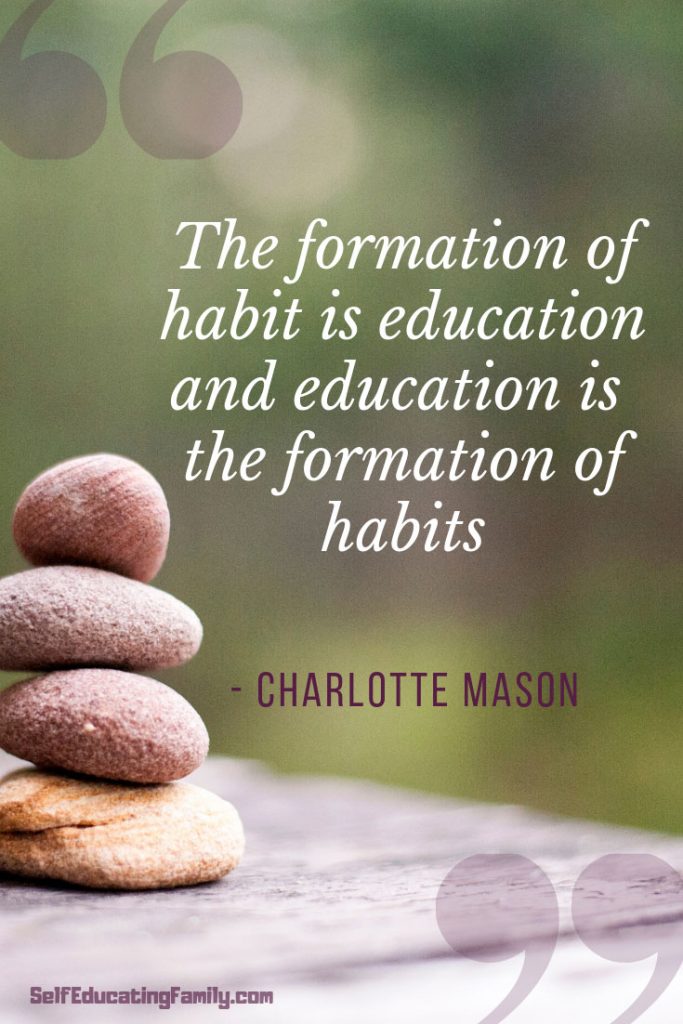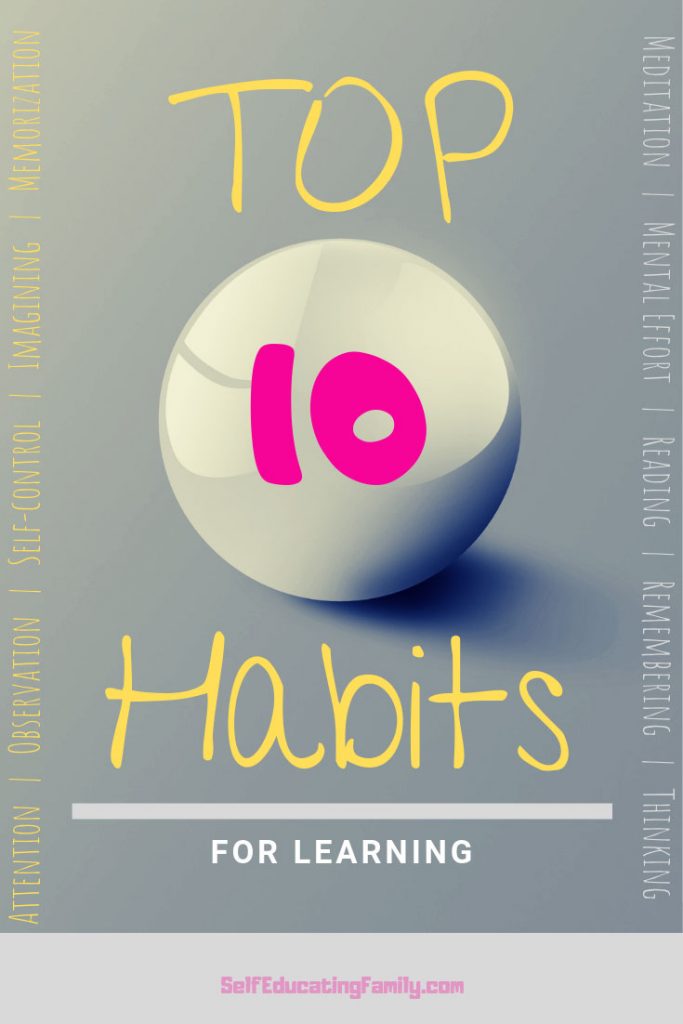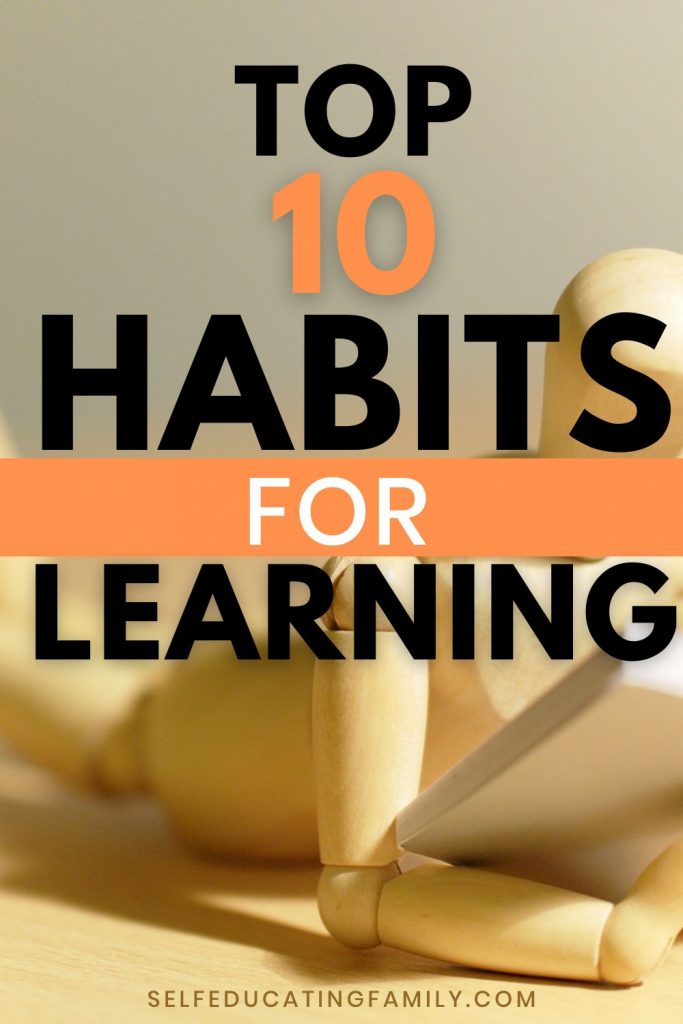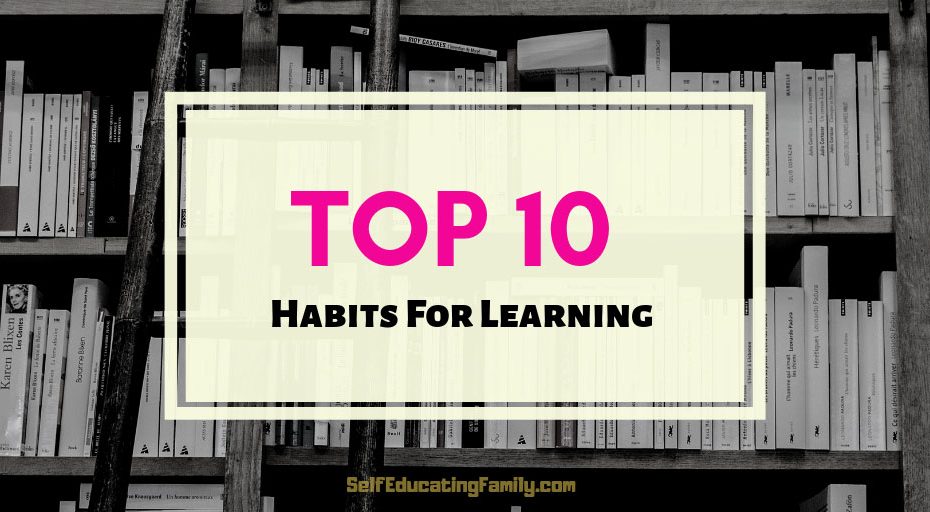What’s inside: Can you improve your learning by improving your habits? Can you teach habits to your kids? A look at why habits can put you and your kids into a learning mindset to ultimately become self-learners.
Can you improve your learning by improving your habits?
In this article, I’ll be looking at forming habits for learning; In particular, I have found resources to help you learn with certain specific habits. I call them “the top 10 essential habits for learning.”
* This post may contain affiliate links. If you find my content valuable and make a purchase through one of my links, I will earn a commission at no cost to you, which helps me keep this blog going so I can help you even more! I recommend products I trust and/or use myself, and all opinions I express are my own. Read the full disclaimer here.
This article gives a broad introduction to a 3-part series on Top 10 Habits for Learning
- 1: Overview (this article)
- 2: Build the Foundation: Basic Habits for Learning
- 3: Grow Your Brain: Advanced Habits for Learning
- Ultimate Resource Roundup for Habits for Learning
Part 1: Overview
As you may know, I’m a big fan of forming good habits. I may not be the best at EXECUTING good habits, but that’s another story! But what does anyone mean by “good” habits? Do I mean brushing and flossing twice a day? Or something else?
While brushing and flossing are great, I’m talking about something else here. I want to talk about habits that actually help you make learning second nature, and I’m going to point you to some resources you can use to make those good learning habits in the upcoming posts.
What are Habits for Learning?
Now, if you’ve ever done an Internet search on “top habits for learning,” you will find lots of practical ideas, like “get good sleep” and “make flashcards” but you will also find some vague ideas like “make a study plan” and “be organized.” You’ll even find some singularly obvious recommendations like “be persistent.” What are they thinking you will be – half-hearted?
The problem with these lists of learning habits is usually that they are aimed at people who are trying to pass tests – they discuss study habits. I’m talking about something slightly different – habits that become part of your character which you can cultivate to become a lifelong learner.
Top 10 Habits for Learning
Here are my top 10 habits to become a better learner:
- Attention
- Observation
- Self-control
- Imagining
- Memorization
- Meditation
- Mental effort
- Reading for instruction (vs. just loving to read)
- Remembering
- Thinking
Some of these characteristics might not SEEM like habits – like the habit of remembering, for instance – but the truth is, you can increase your ability in these areas to the point where it becomes habitual for you to have that characteristic. Second nature if you will. So easy you don’t have to think about it – like breathing.
Back to the Source
When I start talking habits, I usually go back to my source of inspiration for educational habits – the classical educator, Charlotte Mason (CM). She believed good habits were a necessary part of the education of children.

CM elaborated on these habits which I’ve selected for my top 10 and numerous others in her 6-volume series on education.
“Habit rules ninety-nine in a hundred of our Thoughts and Acts.––In the first place, whether you choose or no to take any trouble about the formation of his habits, it is habit, all the same, which will govern ninety-nine one-hundredths of the child’s life: he is the mere automaton you describe. As for the child’s becoming the creature of habit, that is not left with the parent to determine. We are all mere creatures of habit. We think our accustomed thoughts, make our usual small talk, go through the trivial round, the common task, without any self-determining effort of will at all. If it were not so––if we had to think, to deliberate, about each operation of the bath or the table––life would not be worth having; the perpetually repeated effort of decision would wear us out. But, let us be thankful, life is not thus laborious.”[i]
Charlotte Mason
Here, CM is examining our daily efforts – do we have to decide every morning, “Should I make my bed and brush my teeth?” In contrast, if we have a habit, we just wake up and do it – no big deal. So she proposes to make the formation of habits a deliberate, mindful act.
For a good example of this automaticity, the classic cleaning lady for slobs “Flylady” advocates cleaning your sink every night and putting your shoes on every morning. She wants these habits to be like breathing for you.
Deliberate Training
So we see that as children are growing up, certain habits are naturally acquired by the atmosphere of learning; for instance, neatness if your house is neat. I can attest to that one in the reverse – I grew up in a house that wasn’t neat and I find it more often than not that it is an uphill battle to keep my house neat. That doesn’t mean I’m not trying to learn that habit; I just haven’t mastered it yet. They do say that the aging brain doesn’t learn as quickly as a child’s brain. Then again, experts also agree that exercising your brain by learning new things is important as you age. So I will keep learning!
Regardless of when you learn them, certain mental habits are best formed by deliberate training.
“Let us pass on, now, to the consideration of a group of mental habits which are affected by direct training rather than by example.” [ii]
Charlotte Mason
Just as physical habits make mental pathways so that we do things automatically once we have mastery (think about learning to write with a pen or learning to read), CM believed that moral and mental habits could form those same kinds of pathways in the brain which could systematize a person’s approach to learning.
Example of Deliberate Training
Once, I met a person once who could recall the name of every person in a room upon hearing it once. I asked him how he did it. He said he worked on it until he could do it. Deliberately. I’m suggesting he used a combination of attention and remembering.
Example in the classroom from CM
“Wandering Attention.––A vigorous effort of will should enable us at any time to fix our thoughts. Yes; but a vigorous self-compelling will is the flower of a developed character; and while the child has no character to speak of, but only natural disposition, who is to keep humming-tops out of a geography lesson, or a doll’s sofa out of a French verb? Here is the secret of the weariness of the home schoolroom––the children are thinking all the time about something else than their lessons; or rather, they are at the mercy of the thousand fancies that flit through their brains, each in the train of the last. “Oh, Miss Smith,” said a little girl to her governess, “there are so many things more interesting than lessons to think about!”
Where is the harm? In this: not merely that the children are wasting time, though that is a pity; but that they are forming a desultory habit of mind, and reducing their own capacity for mental effort.”[iii]
I love this quote because it forms such a specific mental image. Plus, the fact that CM is talking about lessons taught by a “governess” makes me laugh when I compare it to homeschooling.
For More Overview
* Disclosure: This post contains affiliate links, meaning that if you make a purchase after clicking through, SelfEducatingFamily will receive a small commission at no extra cost to you.
If you want more details on why these habits are so foundational to learning, I recommend the Charlotte Mason Series. While I have often enjoyed reading her original language, the Ambleside Online website does a wonderful job of translating the volumes into modern English and is a rich resource all around.
Charlotte Mason Original HomeSchooling Series
- Volume 1: Home Education
- Volume 2: Parents and Children
- Volume 3: School Education
- Volume 4: Ourselves (original language, annotated version)
- Volume 5: Formation of Character
- Volume 6: Towards a Philosophy of Education (original language, annotated version)
- Whole series, modern English, online or paperback
For more on Charlotte Mason methods:
You can read some of my posts for more detail:
- Charlotte Mason Homeschooling: Tips for a Generous Education
- Charlotte Mason Quotes
- My guest post at Homeschool.com on Evaluating your Charlotte Mason Homeschooling
Next Post: Top 5 Habits for Learning
While all of the habits I mentioned at the top of this post help you learn, the top five provide the foundation. Even young children can practice forming these habits. You want to master the first 5 habits before tackling the second five. Once you lay the foundation AND you have a certain level of maturity, then go for the second bunch!
Caveat
Please note that Charlotte Mason noted and discussed habit training for children in her methodology, but it is not the end-all and be-all of the approach. It’s a technique that can be useful. Or another tool in your belt. Her foundational philosophy and principles are that “Children are born persons” and that “Education is the science of relations.”
But, if you want to know some habits that can be learned by yourself or by your kids, keep reading in this series.
Go Read about the habits in the next posts
- Top 10 Habits for Learning –Part 2: Build the Foundation
- Top 10 Habits for Learning – Part 3: Grow Your Brain: Advanced Habits for Learning

[i] Home Education, Volume 1 of the Charlotte Mason Series, Part III: Habit is Ten Natures, Section V: Laying Down of Lines of Habits, p 110. All quotes are from the annotated version of the Charlotte Mason Series which is copyrighted to www.amblesideonline.org
Note: When CM titled her volume “Home Education,” she was referring to children learning in the home – not homeschooling that we know today – just the things that kids learn growing up in their households. CM actually educated children in a school.
[ii] Ibid. page 138.
[iii] Ibid.p 150

